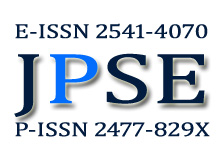Persepsi mahasiswa ditinjau dari student engagement pada implementasi Merdeka Belajar Kampus Merdeka
Abstract
Penelitian ini bertujuan untuk mengungkap persepsi mahasiswa terhadap program Merdeka Belajar Kampus Merdeka serta student engagement mahasiswa setelah mengikuti program Merdeka Belajar Kampus Merdeka. Tujuan dari program Merdeka Belajar Kampus Merdeka adalah meningkatkan kompetensi lulusan, baik keterampilan nonteknis (soft skills) maupun teknis (hard skills), sehingga lulusan lebih siap dan selaras dengan kebutuhan zaman, serta lebih cakap sebagai pemimpin masa depan bangsa yang unggul dan berkepribadian. Sampel penelitian adalah mahasiswa Pendidikan Matematika UPS Tegal yang mengikuti program Merdeka Belajar Kampus Merdeka sebanyak 56 mahasiswa yang terdiri dari mahasiswa semester VI dan VIII. Penilitian ini menggunakan metode survey. Pengumpulan Data dengan Dokumentasi, Angket dan Wawancara dengan analisis data deskriptif kuantitatif. Temuan penelitian menyatakan bahwa pemahaman program Merdeka Belajar Kampus Merdeka diperoleh 2,08% mahasiswa cukup memahami program Merdeka Belajar Kampus Merdeka, 72,92% mahasiswa memahami program Merdeka Belajar Kampus Merdeka, dan 25% mahasiswa sangat memahami program Merdeka Belajar Kampus Merdeka. Jadi dapat disimpulkan bahwa semua mahasiswa sudah mengenal program Merdeka Belajar Kampus Merdeka.
References
Aulia, F., Wahyudin, D., & Rusman, R. (2019). Lecturers Perceptions about E-Learning on the Development of the Indonesian Qualifications Framework Curriculum. https://doi.org/10.4108/eai.19-10-2018.2281283
Al-Tameemi, G., & Xue, J. (2019). Towards an intelligent system to improve student engagement and retention. Procedia Computer Science, 151(2018), 1120–1127. https://doi.org/10.1016/j.procs.2019.04.159
Altuwairqi, K., Jarraya, S. K., Allinjawi, A., & Hammami, M. (2021). A new emotion–based affective model to detect student’s engagement. Journal of King Saud University - Computer and Information Sciences, 33(1), 99–109. https://doi.org/10.1016/j.jksuci.2018.12.008
Arikunto, S. 2013.Prosedur Penelitian Suatu Pendekatan Praktik. Edisi Revisi. Jakarta: PT. Rineka Cipta
Bond, M., & Bedenlier, S. (2019). Facilitating student engagement through educational technology: Towards a conceptual framework. Journal of Interactive Media in Education, 2019(1), 1–14. https://doi.org/10.5334/jime.528
Coates, H., & Friedman, T. (2009). School connections: using ICT to engage students in learning. Retrieved from http://works.bepress.com/hamish_coates/86/
Engels, M. C., Spilt, J., Denies, K., & Verschueren, K. (2021). The role of affective teacher-student relationships in adolescents’ school engagement and achievement trajectories. Learning and Instruction, 75(July 2019), 101485. https://doi.org/10.1016/j.learninstruc.2021.101485
Fredricks, J. A., Blumenfeld, P. C., & Paris, A. H. (2004). School Engagement Potential of The Concept. Review of Educational Research, 74(1), 59–109.
Gray, J. A., & DiLoreto, M. (2016). The Effects of Student Engagement, Student Satisfaction, and Perceived Learning in Online Learning Environments This. NCPEA International Journal of Educational Leadership Preparation, 11(1), 98–119.
Kahn, P. E. (2014). Theorising student engagement in higher education. British Educational Research Journal, 40(6), 1005–1018. https://doi.org/10.1002/berj.3121
Karseth, B., & Sivesind, K. (2010). Conceptualising Curriculum Knowledge Within and, 45(1), 103–120.
Keržič, D., Tomaževič, N., Aristovnik, A., & Umek, L. (2019). Exploring critical factors of the perceived usefulness of blended learning for higher education students. PLoS ONE, 14(11), 1–18. https://doi.org/10.1371/journal.pone.0223767
Laal, M., Laal, M., & Khattami, Z. (2012). 21st century learning ; learning in collaboration. Procedia - Social and Behavioral Sciences, 47, 1696–1701. https://doi.org/10.1016/j.sbspro.2012.06.885
Maneerat, P., Malaivongs, K., & Khlaisang, J. (2015). The Comparison of Thai Qualification Framework for Higher Education and Capability Maturity Model Integration for Service. Procedia - Social and Behavioral Sciences, 182(January), 225–231. https://doi.org/10.1016/j.sbspro.2015.04.759
Manu, B. D., Ying, F., Oduro, D., & Boateng, S. A. (2021). Student engagement and social media in tertiary education: The perception and experience from the Ghanaian public university. Social Sciences & Humanities Open, 3(1), 100100. https://doi.org/10.1016/j.ssaho.2020.100100
Maphosa, C., & Mashau, S. T. (2017). Examining the Ideal 21 Century Teacher- education Curriculum, 1122. https://doi.org/10.1080/09751122.2014.11890194
Nesje, K., & Ruud, E. (2018). Learning and Teaching with Technology – a systematic review. Oslo: Knowledge Center for Education. Retrieved from https://www.scopus.com/inward/record.uri?eid=2-s2.0-85052248425&partnerID=40&md5=976e91e9ab7ea181027b9c51803c34e9
Results, F. (n.d.). Creating Effective Teaching and Learning Environments First Results from TALIS.
Silvola, A., Näykki, P., Kaveri, A., & Muukkonen, H. (2021). Expectations for supporting student engagement with learning analytics: An academic path perspective. Computers and Education, 168(February). https://doi.org/10.1016/j.compedu.2021.104192
Sugiyono. 2018. Metode Penelitian Kuantitatif, Kualitatif, dan R&D. Bandung: Alfabeta
van Braak, M., van de Pol, J., Poorthuis, A. M. G., & Mainhard, T. (2021). A micro-perspective on students’ behavioral engagement in the context of teachers’ instructional support during seatwork: Sources of variability and the role of teacher adaptive support. Contemporary Educational Psychology, 64(December 2020), 101928. https://doi.org/10.1016/j.cedpsych.2020.101928
Walsh, J. N., O’Brien, M. P., & Costin, Y. (2021). Investigating student engagement with intentional content: An exploratory study of instructional videos. The International Journal of Management Education, 19(2), 100505. https://doi.org/10.1016/j.ijme.2021.100505









